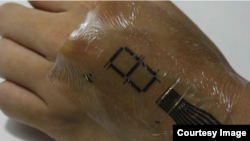Japanese researchers are testing an "electronic skin" that one day could be used to track biomedical data.
Writing in the journal Science Advances, University of Tokyo researchers say the “ultrathin, ultraflexible” film they developed will allow functions like blood oxygen level and heart rate to be displayed electronically via a light-emitting diode built into the e-skin.
The e-skin is a mere 2 micrometers thick and is made from alternating layers of silicon oxynitrite and parylene. Researchers said a special electrode inserted between the layers allowed them to attach the polymer light-emitting diodes and organic photodetectors to the skin. The diodes - more than 10 times thinner than a human hair - are so efficient that they need little electrical power and produce little heat.
Researchers say such development holds promise for wearable technology.
"The advent of mobile phones has changed the way we communicate. While these communication tools are getting smaller and smaller, they are still discreet devices that we have to carry with us," said Takao Someya of the University of Tokyo's Graduate School of Engineering. "What would the world be like if we had displays that could adhere to our bodies and even show our emotions or level of stress or unease? In addition to not having to carry a device with us at all times, they might enhance the way we interact with those around us or add a whole new dimension to how we communicate."
This is not the first e-skin, but researchers say it’s more durable and comfortable to wear because of how thin and flexible it is. The skin also doesn’t allow oxygen and water vapor in the air to reach the electronics, increasing the device's potential lifetime from “a few hours” to “several days.”
Here's how the skin works:





